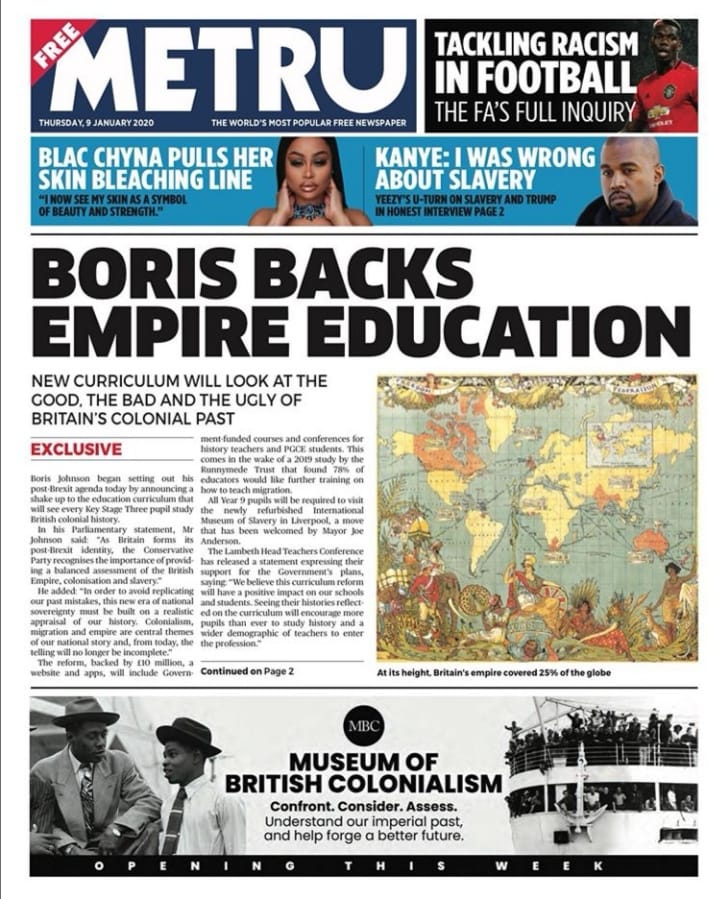The Quest to Decolonise the UK National Curriculum

By Fisayo Eniolorunda, BA Politics & African Studies
I remember getting up at 7 A.M. as a teenager doing my GCSE’s, which at the time felt like the most tiresome quest of all. A sequence that often began with me groaning at the piercing sound of my alarm clock, whilst reaching for the snooze button, fatigued from my lack of sleep. The same 10-minute snooze button that I would dismiss over and over again until my subconscious would prick me awake. Often, I’d be late and would spend half of my school day drowning in self-pity. But, as an oblivious teenager, I would delight myself as I arrived at my classes, knowing that I had spent the night before tirelessly memorising quotes from the likes of William Shakespeare and historical facts from Stuart Britain, ready to sit my exams.
Like most others, the academic content of my secondary education here in Britain rarely exceeded the bounds of imperial and Eurocentric glorification. I was mindless of the fact that less than 70 years ago, teenagers in Kenya were being slaughtered in the Mau Mau uprisings of 1951-1960. A barbarity by the British colonial Empire that saw up to 100,000 Kenyans killed, mistreated, tortured, and raped in ‘British gulags’ by British colonial forces.
Ideological imperialism has systematically plagued the education system in England and British youths have simply had enough.
Presently, the compulsory education system in England omits the demented realities of the British Empire that continue to contribute to the subjugation and systematic oppression faced by ethnic minorities in the country today. Certainly, the influence of this systematic prejudice manifests itself in the political thought of society. In the year 2014, for example, as found by a YouGov poll, 59% of Britons declared themselves ‘proud of the British Empire’, that is, proud of a history of violence that fails to be confronted, assessed, or accounted for.
#fillintheblanks Campaign
At 7 A.M. on the morning of Thursday 9 January 2020, a group of seven British youths from South London staged a city-wide campaign calling for the teaching of British colonial history for students all over the United Kingdom. The campaign involved the distribution of 5000 copies of their own version of some of the UK’s most widely read newspapers. These hijacked newspapers featured stories centred around black British history. One of them was a ‘METRU’ newspaper which claimed that the Department for Education had announced the mandatory teaching of the history of the British empire to all key stage three students.
Why?
The reason was simple:
‘Black history is British history’- Jeremy Corbyn.
These youths want to see a time where the history of people of colour is acknowledged as components of and contributors to the British nation-state. Ideological imperialism has systematically plagued the education system in England and British youths have simply had enough.
As stated by the leaders of the campaign:
‘We want everyone to learn about the British Empire and its history in the land we call home. We are a group of sixth-form students, who came together on The Advocacy Academy’s social justice fellowship programme, working to ensure that each young person in the UK will have the opportunity to be taught a history that reflects our country’s diversity. We would like to dismantle the institutional racism within our education system and curriculum one step at a time.’
The Black Curriculum
The Black Curriculum is an educational organisation directed by former SOAS student, Lavinya Stennett. It campaigns to include black British history in the education system. The black curriculum syllabus supports schools by working with year groups and small cohorts to extend their thoughtfully curated syllabus. The 12 topic curriculum aligns with the national KS3 and KS4 level curriculum and covers multiple facets of black British history. This concerns the teaching of History, Geography, PSHE, Citizenship, Music, and Art in a way that develops a deeper understanding of black British history. The education campaign effectively strives to embed black British history into the British curriculum, exceeding the limitations of Black History Month.
One thing is clear, many hope to see a day where British students are mandatorily taught about all facets of British history, without the omission of systematically oppressed groups or the ghastly situational realities.
For more information on these campaigns, please visit:
Fill in the Blanks
Instagram:
https://instagram.com/theblackcurriculum?igshid=13vb4hxluthxe
The Black Curriculum
Website:
https://www.theblackcurriculum.com/
Instagram:
https://instagram.com/theblackcurriculum?igshid=13vb4hxluthxe





